Filter by

Treading Softly: Paths to Ecological Order
"We are living beyond our means, running up debts both economic and ecological, consuming the planet's resources at rates not remotely sustainable. But it's hard to imagine a different way. How can we live without cheap goods and easy credit? How can we consume without consuming the systems that support life? How can we live well and live within our means? In Treading Softly, Thomas Princen hel…
- Edition
- -
- ISBN/ISSN
- 9780262266079
- Collation
- 1 online resource (xi, 210 pages)
- Series Title
- -
- Call Number
- -
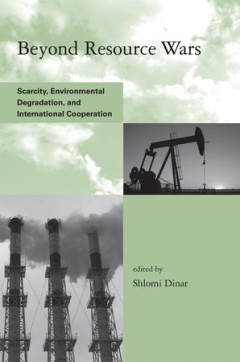
Beyond resource wars: Scarcity, environmental degradation, and international …
Common wisdom holds that the Earth's dwindling natural resources and increasing environmental degradation will inevitably lead to inter-state conflict, and possibly even set off 'resource wars'. This book offers a different perspective on the links between environmental problems and inter-state conflict.OCLC-licensed vendor bibliographic record.
- Edition
- -
- ISBN/ISSN
- 9780262295505
- Collation
- 1 online resource (xii, 335 pages) :illustrations.
- Series Title
- -
- Call Number
- -

Open for business :conservatives' opposition to environmental regulation
A detailed analysis of the policy effects of conservatives' decades-long effort to dismantle the federal regulatory framework for environmental protection.Since the 1970s, conservative activists have invoked free markets and distrust of the federal government as part of a concerted effort to roll back environmental regulations. They have promoted a powerful antiregulatory storyline to counter e…
- Edition
- -
- ISBN/ISSN
- 9780262305297
- Collation
- 1 online resource.
- Series Title
- -
- Call Number
- -

Governing environmental flows :global challenges to social theory
Lays the foundations for a new conceptualization of global environmental governance that draws on the flow perspective found in recent work in sociology.OCLC-licensed vendor bibliographic record.
- Edition
- -
- ISBN/ISSN
- 9780262284103
- Collation
- 1 online resource (xvii, 377 pages) : illustrations, map
- Series Title
- -
- Call Number
- -

Green giants? :environmental policies of the United States and the European U…
The United States in recent years has been abandoning its historical role as a leader in environmental regulation. At the same time, the European Union, spurred by political integration, has enacted many new environmental laws and assumed a leadership role in promoting global environmental sustainability. Green Giants?, one of the most detailed comparisons of the environmental policies of Ameri…
- Edition
- -
- ISBN/ISSN
- 9780262285544
- Collation
- 1 online resource (xiii, 398 pages)
- Series Title
- American and Comparative Environmental Policy
- Call Number
- -
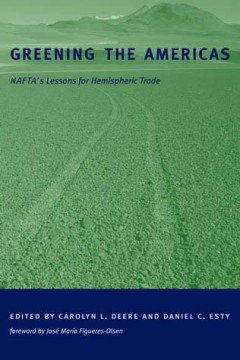
Greening the Americas :NAFTA's lessons for hemispheric trade
"Many of the papers included in this volume were first presented and discussed in the Spring of 2000 at a conference on lessons from the NAFTA for the FTAA"--Preface.Attention to environmental issues is vital if the full potential economic benefits of international trade are to be realized. Greening the Americas offers a number of analytically rigorous proposals to ensure that economic integrat…
- Edition
- -
- ISBN/ISSN
- 9780262271387
- Collation
- 1 online resource (xiv, 382 pages) : illustrations
- Series Title
- -
- Call Number
- -
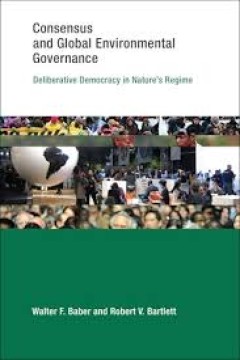
Consensus and global environment governance :deliberative democracy in nature…
In this book, Walter Baber and Robert Bartlett explore the practical and conceptual implications of a new approach to international environmental governance. Their proposed approach, juristic democracy, emphasizes the role of the citizen rather than the nation-state as the source of legitimacy in international environmental law; it is rooted in local knowledge and grounded in democratic deliber…
- Edition
- -
- ISBN/ISSN
- 9780262327046
- Collation
- 1 online resource (xviii, 251 pages) :map.
- Series Title
- -
- Call Number
- -
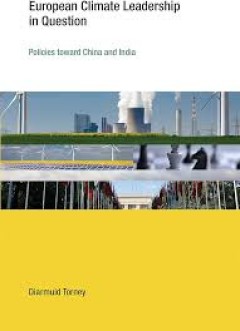
European climate leadership in question :policies toward China and India
The EU has, for a long time, portrayed itself as an international leader on climate change. Previous studies have tended to focus on the characteristics of EU leadership, but have failed to examine the extent to which EU leadership generates 'followship'. This book analyzes EU climate policies towards China and India in order to provide a holistic assessment of EU climate leadership, and makes …
- Edition
- -
- ISBN/ISSN
- 9780262329606
- Collation
- 1 online resource.
- Series Title
- -
- Call Number
- -
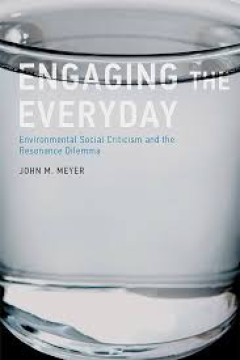
Engaging the Everyday: Environmental Social Criticism and the Resonance Dilemma
An argument that environmental challenges will only resonate with citizens of affluent postindustrial countries if sustainability concerns emerge from everyday practices.OCLC-licensed vendor bibliographic record.
- Edition
- -
- ISBN/ISSN
- 9780262327107
- Collation
- 1 online resource (ix, 253 pages)
- Series Title
- -
- Call Number
- -
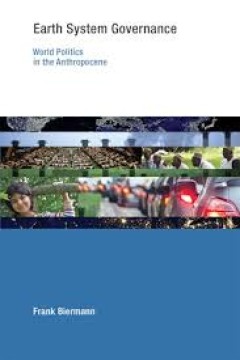
Earth System Governance: World Politics in the Anthropocene
In an era of planet-wide transformation, we need a new model for planet-wide environmental politics. This book proposes 'earth system' governance as just such a new paradigm. It offers both analytical and normative perspectives. It provides detailed analysis of global environmental politics in terms of five dimensions of effective governance: agency, particularly agency beyond that of state act…
- Edition
- -
- ISBN/ISSN
- 9780262322928
- Collation
- 1 online resource.
- Series Title
- -
- Call Number
- -
 Computer Science, Information & General Works
Computer Science, Information & General Works  Philosophy & Psychology
Philosophy & Psychology  Religion
Religion  Social Sciences
Social Sciences  Language
Language  Pure Science
Pure Science  Applied Sciences
Applied Sciences  Art & Recreation
Art & Recreation  Literature
Literature  History & Geography
History & Geography